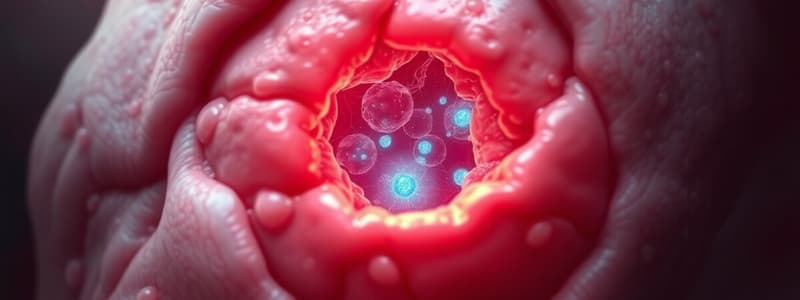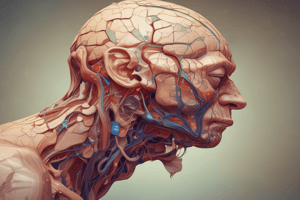Podcast
Questions and Answers
What is the primary function of the skin in relation to pathogens?
What is the primary function of the skin in relation to pathogens?
- Regulation of body temperature
- Acts as a physical barrier (correct)
- Sensation through mechanoreceptors
- Produces sweat for cooling
Which component of the integumentary system is primarily responsible for detecting mechanical stimuli?
Which component of the integumentary system is primarily responsible for detecting mechanical stimuli?
- Sebaceous glands
- Thermoreceptors
- Langerhans cells
- Mechanoreceptors (correct)
Which type of sweat gland is primarily involved in thermoregulation?
Which type of sweat gland is primarily involved in thermoregulation?
- Sebaceous glands
- Apocrine glands
- Eccrine glands (correct)
- Sebaceous cysts
Which layer of the skin does not develop from ectoderm?
Which layer of the skin does not develop from ectoderm?
What is the largest organ of the body by weight?
What is the largest organ of the body by weight?
Which of the following is NOT a function of the integumentary system?
Which of the following is NOT a function of the integumentary system?
What constitutes the hypodermis?
What constitutes the hypodermis?
Which of the following statements about skin disorders is correct?
Which of the following statements about skin disorders is correct?
What is the primary function of keratinocytes in the epidermis?
What is the primary function of keratinocytes in the epidermis?
Which cells are involved in detecting foreign invaders within the skin?
Which cells are involved in detecting foreign invaders within the skin?
What kind of epithelium makes up the epidermis?
What kind of epithelium makes up the epidermis?
What is the role of lamellar granules in the skin?
What is the role of lamellar granules in the skin?
Which layer of the epidermis is directly superficial to the stratum basale?
Which layer of the epidermis is directly superficial to the stratum basale?
What does the stratum granulosum primarily consist of?
What does the stratum granulosum primarily consist of?
Which sensory receptor is responsible for detecting pain sensations?
Which sensory receptor is responsible for detecting pain sensations?
What type of tissue primarily composes the epidermis?
What type of tissue primarily composes the epidermis?
What type of connective tissue primarily composes the reticular dermis?
What type of connective tissue primarily composes the reticular dermis?
Which layer of the skin is the deepest and involved in the continuous production of new keratinocytes?
Which layer of the skin is the deepest and involved in the continuous production of new keratinocytes?
Which of the following conditions is characterized by a benign localized overgrowth of melanocytes?
Which of the following conditions is characterized by a benign localized overgrowth of melanocytes?
Which skin glands are largely found in the lips, glans penis, and labia minora?
Which skin glands are largely found in the lips, glans penis, and labia minora?
What pigment primarily influences the color of the skin?
What pigment primarily influences the color of the skin?
Individuals with albinism are unable to produce which enzyme necessary for melanin synthesis?
Individuals with albinism are unable to produce which enzyme necessary for melanin synthesis?
Which of the following is a condition caused by an autoimmune response affecting melanocytes?
Which of the following is a condition caused by an autoimmune response affecting melanocytes?
The secretory portion of sebaceous glands is primarily located in which layer of the skin?
The secretory portion of sebaceous glands is primarily located in which layer of the skin?
What components are included in perspiration produced by excretory ducts?
What components are included in perspiration produced by excretory ducts?
What triggers the function of secretion in excretory ducts?
What triggers the function of secretion in excretory ducts?
Which of the following is true about deep wound healing?
Which of the following is true about deep wound healing?
What characterizes a hypertrophic scar?
What characterizes a hypertrophic scar?
What is the primary cause of pressure ulcers or decubitus ulcers?
What is the primary cause of pressure ulcers or decubitus ulcers?
What happens during the inflammatory phase of wound healing?
What happens during the inflammatory phase of wound healing?
What type of burn is characterized by redness, blister formation, and pain?
What type of burn is characterized by redness, blister formation, and pain?
Which statement accurately describes keloid scars?
Which statement accurately describes keloid scars?
What is the primary function of melanocytes in the epidermis?
What is the primary function of melanocytes in the epidermis?
Which epidermal layer is characterized by flattened clear, dead keratinocytes, and is found only in thick skin?
Which epidermal layer is characterized by flattened clear, dead keratinocytes, and is found only in thick skin?
What role do dendritic cells, or Langerhans cells, serve in the epidermis?
What role do dendritic cells, or Langerhans cells, serve in the epidermis?
What is the composition of the papillary dermis?
What is the composition of the papillary dermis?
What is the main characteristic of the stratum corneum in the epidermis?
What is the main characteristic of the stratum corneum in the epidermis?
Which cells are primarily responsible for tactile sensation in the epidermis?
Which cells are primarily responsible for tactile sensation in the epidermis?
What abnormal condition is characterized by thickening of the skin due to repeated friction?
What abnormal condition is characterized by thickening of the skin due to repeated friction?
What type of connective tissue is primarily found in the dermis?
What type of connective tissue is primarily found in the dermis?
What layers of the epidermis contain dead keratinocytes?
What layers of the epidermis contain dead keratinocytes?
What type of fibers are primarily found in the dermis to provide tensile strength?
What type of fibers are primarily found in the dermis to provide tensile strength?
Flashcards are hidden until you start studying
Study Notes
Excretory Duct and Skin Functions
- Apocrine sweat glands produce perspiration, which contains lipids and proteins in addition to components from eccrine sweat glands.
- Apocrine glands are stimulated by emotional stress and sexual excitement, with function onset occurring at puberty.
- Wound healing of the epidermis occurs in response to abrasions and minor burns, limited to the epidermal layer.
Wound Healing Processes
- Deep Wound Healing: Involves significant damage extending through the dermis to subcutaneous tissue. Characterized by redness, blistering, edema, and pain.
- Scar Tissue Formation: Results in fibrosis, leading to hypertrophic scars (elevated above the epidermis) and keloid scars (extend beyond original wound boundaries).
- Pressure Ulcers: Also known as decubitus ulcers, caused by prolonged pressure leading to tissue damage. Result from inadequate blood flow to areas over bone projections, especially in bedridden patients.
Structure of the Skin
- The skin, known as the cutaneous membrane, is the largest organ of the body by weight and comprises the epidermis, dermis, and hypodermis.
- The hypodermis is made of areolar and adipose tissue, not classified as part of the skin.
Integumentary System Functions
- Protection: Acts as a physical barrier against environmental hazards.
- Temperature Regulation: Sweat glands expel sweat, promoting heat loss through evaporation.
- Sensation: Skin contains mechanoreceptors, thermoreceptors, and nociceptors for touch, temperature, and pain detection.
- Excretion: The skin helps eliminate waste.
- Immune Defense: Langerhans cells in the skin assist in pathogen detection and immune response.
Epidermis Layers
- Stratum Basale: Deepest layer consisting of columnar keratinocytes and stem cells for continuous renewal, along with melanocytes and tactile cells.
- Stratum Spinosum: Contains keratinocytes with coarse keratin, providing strength and flexibility.
- Stratum Granulosum: Features flattening keratinocytes undergoing apoptosis, contributing to a water-repellent barrier.
- Stratum Lucidum: Present only in thick skin; flattened keratinocytes are clear and packed with keratin.
- Stratum Corneum: Composed of 25-30 layers of dead, flattened keratinocytes, protecting deeper layers from injury and microbial invasion.
Dermis Structure
- Papillary Dermis: The superficial layer, consisting of areolar connective tissue with dermal ridges housing blood vessels and nerve endings.
- Reticular Dermis: The deeper, thicker part composed of dense irregular connective tissue, housing hair follicles, sebaceous, and sweat glands.
Skin Color Factors
- Skin color is influenced by melanin, hemoglobin, and carotene.
- Conditions such as freckles (skin patches with concentrated melanin), nevi (benign growths of melanocytes), and albinism (lack of melanin production) affect skin pigmentation.
Skin Glands
- Sebaceous Glands: Predominantly located in the lips, genital areas, and absent in palms and soles. Typically connected to hair follicles for secretion.
Studying That Suits You
Use AI to generate personalized quizzes and flashcards to suit your learning preferences.




